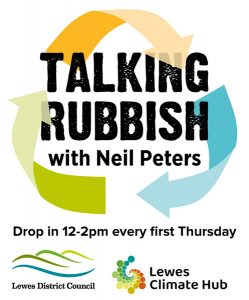Right on the Money: What’s in your Pension? For many people, a pension is one of...
Read MoreLifestyle - simple changes can have a big impact
Tackling the challenges facing our climate and natural environment first and foremost requires urgent action by governments and big business. But there are also measures we can each take in our day-to-day lives to reduce greenhouse gas emissions and support and protect biodiversity. See what’s happening locally and find practical advice via the links and our 10 top tips.
In January 2025 we ran a season called 10 Resolutions to Help Save The Planet. You can download the 10 Resolutions here, along with details of organisations who can help you make the changes required, whether it’s a more ethical bank, green energy supplier or Flight Free UK.
Right on the money: Green bank accounts and ethical savings
Right on the Money: Green bank accounts and ethical savings In his monthly column on green...
Read MoreRight on the money: Aligning your investments with your values
photo- Freepik Right on the money: Aligning your investments with your values Lots of people come...
Read MoreNEW! Talking Rubbish with Neil Peters
Talking Rubbish with Neil Peters First Thursday of every month, drop in anytime between 12 noon...
Read MoreNEW! Family Swap Shop with Meredith Brooklyn
Family Swap Shop ****ON HOLD**** Our family swap shop has been paused while we find a...
Read MoreStarting your own Neighbourhood Coffee Collective
Nevill Coffee Collective member Andy Capie Starting your own Neighbourhood Coffee Collective A group of coffee-loving...
Read MoreClimate Cafe Lewes
What is a Climate Café? Perhaps you have begun to worry about what is happening to...
Read MoreLewes Home Retrofit Guide
Lewes Home Retrofit Guide This guide aims to provide householders with advice on how to make...
Read MoreHere are 10 of the most effective personal actions to take

1 Live car-free or switch to an electric car
About a quarter of Europe’s greenhouse gas emissions come from transport. Using your car less – perhaps by car-sharing or joining a car club like Co-Wheels – can have a massive impact on your carbon footprint. If you can’t do without a car, moving to an electric car is the next step. Or an electric bike can be a good way to get around, with a motor to take the strain when hauling shopping or getting up Lewes’ steep hills! See our Transport selection to learn more.
2 Fly less
The aviation industry is responsible for about 5% of global warming. Compared to taking the train – or even travelling in a full car of passengers – flying can emit more than six times more emissions per person, per km travelled. You can be motivated to stop flying by taking the flight-free pledge while The Man in Seat 61 offers lots of inspiring ideas for getting around the world by train.
3 Install clean energy and/or switch to a clean energy supplier
Installing solar panels, solar water heating or an air-source heat pump can be a great investment in shrinking your future carbon foot print and there are grants to help ease the cost – see our Energy section to learn more. If this is an outlay you can’t make just yet, switching to a clean energy supplier is the next-best step. You can explore different green electricity tariffs at Big Clean Switch here.
4 Make your home more energy efficient
Alongside using clean energy, using less energy can not only reduce your carbon footprint, it can also cut your household bills. If you have an older house, draught-proofing and turning down your thermostat is one of the most effective steps you can take to reduce the cost of running your home (according to Energy.gov, you can save about 1% on your heating bill for each degree your thermostat is turned down during cold weather). See draughtproofing tips here. [link to LCH or TTL resources]. Installing a smart meter can also help you track where your energy use is going while LED bulbs and other energy efficient appliances can slash consumption – speak to your energy supplier to learn more.
5 Eat less meat and dairy…
Rearing red meat has been shown to have multiple impacts on the planet. Compared with a 100g portion of vegetables, a 50g chunk of red meat is associated with at least 20 times as many greenhouse gas emissions and 100 times as much land use. Producing 1 kilo of beef takes 15,415 litres of water – compared to the 322 litres used for vegetables. Dairy products are not much better: they are estimated to contribute about 3.6 percent of global planet-warming emissions each year. Even if you can’t cut out meat completely, going vegan for two-thirds of meals could cut your food-related carbon emissions by 60%.
6 …and eat locally and seasonally
Cutting down meat is only half the story however. Swapping meat for Californian-grown almonds, avocados flown in from Peru, or soya that’s farmed unsustainably can be almost as damaging for the planet. Supporting local food producers and farmers and eating food that’s organic and seasonal can slash your food miles, give you food that’s nutritionally richer, and encourage more sustainable food-growing practices. See our Food section to learn more.
7 Say good-bye to fast fashion
The fashion industry produces 10% of the world’s carbon dioxide emissions every year, and is estimated to use around 1.5 trillion litres of water annually. Alongside pollution from chemical manufacturing processes, and synthetic clothes shedding microplastic fibres, around 350,000 tonnes of used clothing goes to landfill every year in the UK alone. There’s now a growing movement for slow and ethical fashion – encouraging shoppers to buy less, wear longer and check that what they do buy is made sustainably. The Lewes Repair Café can help you mend what you have, while local enterprises like Dolly Clothing hold regular sewing classes, clothes swaps and events to raise awareness of the impact of fashion on the environment.
8 Reuse, repair and recycle where you can
Alongside consuming fashion more mindfully, a ‘reduce, reuse, repair and recycle’ mindset can help all of us minimise how much of the world’s precious resources we use. Again, the Lewes Repair Café is a great resource to revive a variety of household objects – and it’s also planning to set up a Library of Things where items can be borrowed instead of bought. Online swapping services like Freegle, Freecycle and Lewes’ local Now! Charity let you give away things you don’t need – and find things you do for free. And imaginative repurposing (paint tins as plant pots!) can give a host of items a new lease of life.
9 Tackle plastic and water pollution
Even if you’re careful not to litter and you recycle, you can still be contributing to plastic pollution. Synthetic clothes can shed fibres when washed and plastic that can’t be recycled either ends up in landfill or being incinerated where it can produce toxic dioxins. Actively reducing the amount of plastic waste your household generates is key – see our Waste and Reuse section and Plastic Free Lewes for tips. But it’s not just plastic that’s harming our environment: disposing of paints, fertilizers and other chemicals down household drains can harm our drinking water, rivers and oceans – consult product labels and the council for safe disposal.
10 Reduce water waste
In an often rainy climate, water can seem like an endless resource. But global warming could see the UK enter periods of serious drought – and treating water for re-use is highly energy intensive. Simple steps can reduce the 150 litres we’re each estimated to use each day – from mending leaky plumbing, to only using dishwashers and washing machines for full loads, installing a water butt for watering the garden– and linking bills to a water meter to incentivise less use. See our Water section for more tips.
Groups & contacts
Lewes Food Market
Plastic Free Lewes
Common Cause/Lewes
Farmers Market
Lewes Repair Cafe
Green Cuisine Trust
Lewes District Council has set up these websites to support local businesses:
www.shoplocal.info
www.eatlocal.info
www.makelocal.info
Further resources
TTL Guide to Electric Cars
TTL Guide to Electric Bikes
Flight Free UK
Big Clean Switch
Dolly Clothing
Freegle
Freecycle
Now! Charity
Dolly Clothing
SuperLooperLife baby clothes library Brighton






